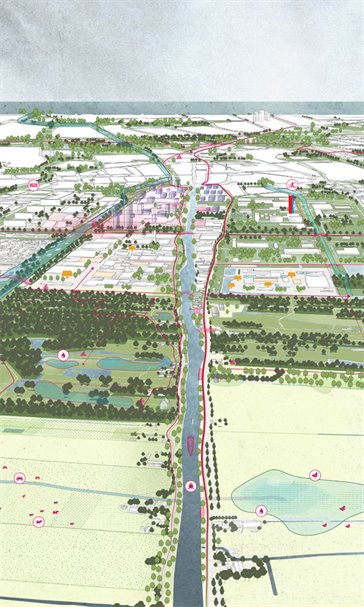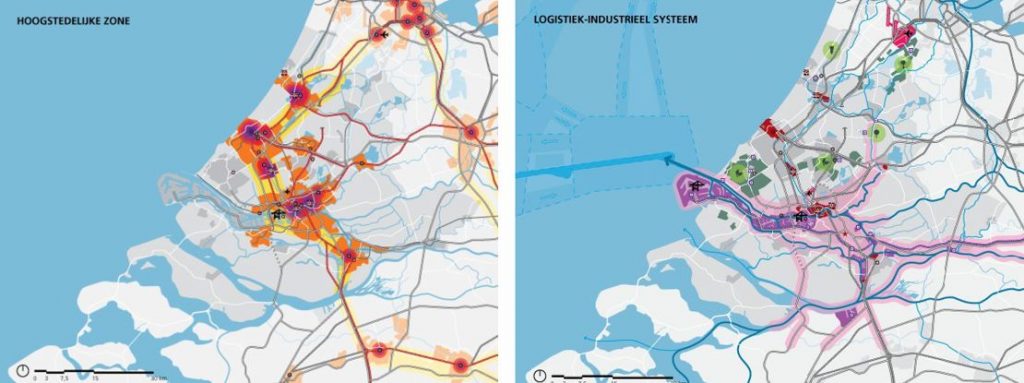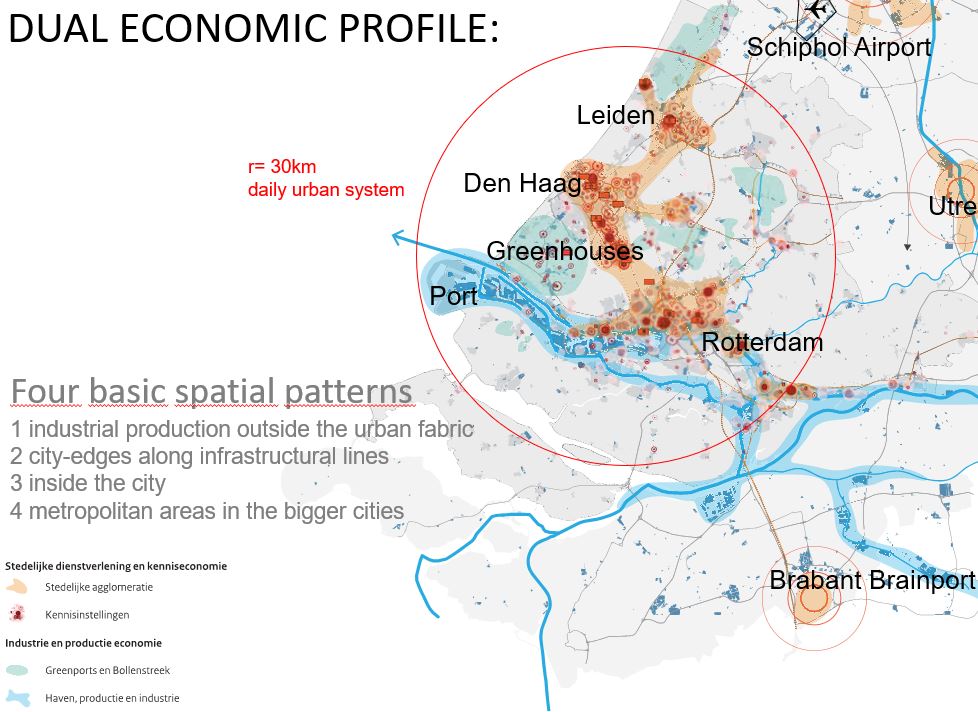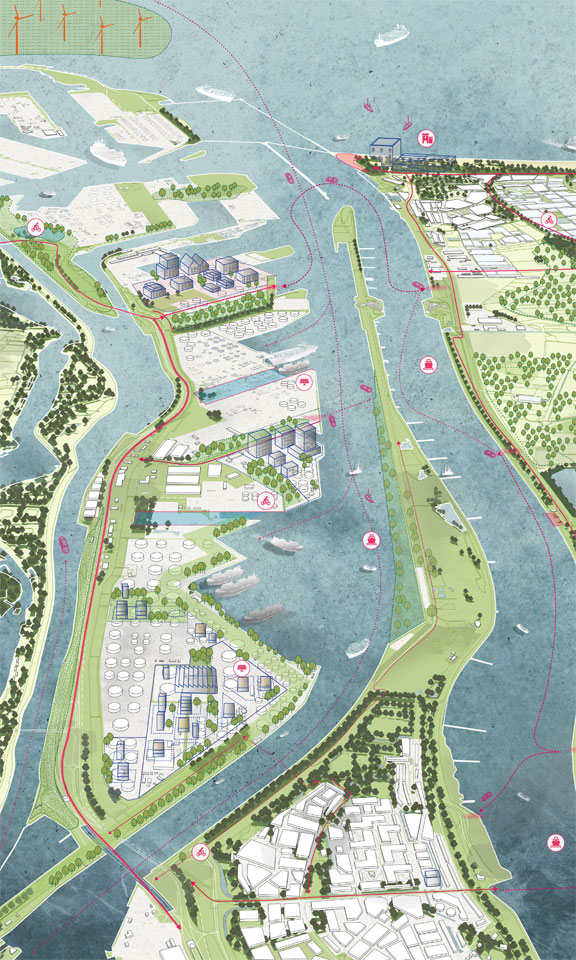Thank you very much for accepting this interview for PORTUS Portrait, focused on Rotterdam.
We would like to talk with you about the role of Rotterdam as a port city territory. How can the Province of South Holland facilitate future transitions in terms of urbanization and quality of life, economic and productive development?
INTERVIEWER | Paolo DE MARTINO
Could you tell us about your role within the Province? What are the main challenges (and scales) the port city of Rotterdam is facing at the moment and also what kind of opportunities do you see there?
INTERVIEWEE | Helmut THÖLE, Strategic advisor on spatial policies, Province of South Holland
I work in the province of South Holland as an urban and regional planner. My role is now strategic advisor on spatial policies. I started 16 years ago coming in from the design world of Rotterdam. The dynamics and challenges of our urbanization and economic development are linked to a local, regional and (inter-)national scale. Main focus is on the Southern part of the Randstad Holland which is an urban field with a lot of diverse and strong cities and knowledge clusters, as well as large-scale infrastructures and industry. The provincial organization is currently linked to different more or less classical themes. We are a political organization representing the regional scale between national and local level. We have a parliament and a regional government where civil servants like me are working. I am from the spatial department but what we always try to focus on is actual societal challenges. Doing that means to connect economic issues, landscape, water to metropolitan development and the professionals behind that. We are quite successful with linking our urbanization with transit-oriented development strategies on the regional scale. We have reached a point where we have to connect and align our economic development and our spatial and urban development in a better way. Not only the urban and knowledge-based part of it but very much also the Mainport Rotterdam and the industrial complex of chemical and maritime activities, and also of our highly technological horticultural industry with all its logistics and infrastructures. Based on the notion that our economy has to develop into a more sustainable, circular and digital way on the one hand – and very limited space on the other hand – there is a strong belief and urgency that we have to renegotiate how we deal with spatial and societal challenges in this region.
Knowing we are depending on our connectivity and a lot of partners we are also trying to act at the international level, on a scale and area that we call the Euro Delta of Rhine, Meuse and Scheldt which is a highly dense area in the European Union. We share a lot of societal challenges related to urbanization, infrastructure, energy, water. All of these are asking for space. So, we try to reflect on the societal challenges and new social and spatial questions by connecting different perspectives, but also by understanding who they belong to. What are the needs at stake and who are the different parties involved?
But we also have to learn and improve. We are used to facilitating economic growth and progress. But today this is changing and together with the port, the metropolitan region, the city of Rotterdam, people and enterprises, we are looking for opportunities and also new spatial settings where we can test and facilitate future transitions. We all know that issues like climate change, circular economy, digitization and social challenges, are really big challenges and we really have to find alternative growth paths connecting all these things instead of working with black and white or extreme scenarios like “the port has to move out”. We need a more integrated and connecting vision and I believe that it can happen in a productive way.

In the image “Landscape Park South Wing”. (Illustration by Provincie Zuid-Holland; Fotoalbum Ruimtelijke Kwaliteit, Panorama Zuid-Holland, 2021; https://www.zuid-holland.nl/onderwerpen/ruimte/ruimtelijke/oktober-2020-maand-ruimtelijke-kwaliteit/panorama-zuid-holland/).
INTERVIEWER | Paolo DE MARTINO
Could you elaborate a bit more on governance? Do you directly influence the planning or does the Province move more on a strategic level?
INTERVIEWEE | Helmut THÖLE, Strategic advisor on spatial policies, Province of South Holland
As a Province we use different sets of instruments and we also have legal obligations and instruments. One of our core tasks is spatial planning and we have a set of soft and hard instruments to organize that within our area for our 3.7 million inhabitants. It is also important to see our work in the context of a decentralization of former national tasks and roles in 2010. Especially spatial planning has since been a regional task for the provinces. Another relevant task is controlling the environmental activities and effects of economic activities. We also have economic development in our portfolio next to water, mobility, landscape and agriculture. As a mid-level government we also have an important role in supporting local governance.
What we mostly try is to bring politicians and all parties together in alliances. We try to connect a lot of players around a common interest, for example, energy. One of our projects is called “Heath Network”, where we try to install a multi-commodity grid where we can exchange CO2 and heat from the industry to the Greenport, which needs a lot of heat and CO2. This heat and CO2 is a necessity for the city and therefore people.

INTERVIEWER | Paolo DE MARTINO
What, do you think, will be the impact of port development on the cities and territories nearby? What does the city of Rotterdam contribute to making the Port more attractive than others? What elements do you think the Port of Rotterdam contributes to the City and the Province to make them more competitive and sustainable than others?
INTERVIEWEE | Helmut THÖLE, Strategic advisor on spatial policies, Province of South Holland
First of all, I think it is important to link and refer to our identity as a connected and open delta region and this identity of course has the port at its core because it connects us with the world and South Holland thrives on this connectivity.
Of course, the port can be transformed and its relation with the territory renegotiated.
We see today many interesting enterprises that are following new business models. These are digital, circular minded, knowledge based and have all the new skills that the port also needs to move forward. Sometimes port activities and more urban based economic activities do not naturally connect and understand each other, however. That is why and how we like to help: to see more opportunities, to try new things and to give some space to the activities we would like to accelerate and to scale-up. But you need spaces to experiment and negotiate borders and see what could work in the future. This is what Merwe-Vierhaven (M4H) in Rotterdam is about. There are a lot of things happening in this area and for the Province this is an important case and element of our story on port city relations and how we present ourselves as a developing region. That is why, Merwe-Vierhaven is one of the 13 flagship spatial projects of our region and all partners united in an urbanization-alliance. This is one of the places where we try to develop new economic activities and we are testing a new economic ecosystem: a Makers District consisting of a mix of urban and more industrial, maritime and logistical activities.
For the port this is a risk and it requires from us all a lot of inventiveness and flexibility. Making things happen is the slogan of Rotterdam and we take this seriously when we present ourselves internationally as a region where we pioneer with practical solutions for societal challenges. So, when you come here you can see the complexity but you also see us always trying to improve, trying to adapt to the current challenges. However, when it comes to the industrial cluster and businesses, we need to be better connected. We need to put more effort on that and connect this innovation to the city. We need more and more collaborations with enterprises and knowledge institutions such as the TU Delft. Because we see that the industrial and logistical cluster is highly innovative but can be even more innovative and attractive when more crossovers with urban knowledge clusters, but also new links with society and culture are developing. And this is an important aspect to reflect on if we want to move towards the future.

INTERVIEWER | Paolo DE MARTINO
What kind of different scenarios do you imagine to improve environmental sustainability and to mitigate the impact that port industry has on the city in terms of environmental pollution?
INTERVIEWEE | Helmut THÖLE, Strategic advisor on spatial policies, Province of South Holland
At the moment we are trying to develop scenarios together with national knowledge institutions. We have to take a people-based economy approach seriously because we know we need an excellent and innovative skill-set, but are we willing to give that more space and priority? What is the impact of digitalization, logistics, energy infrastructures, circular economy on space and on the quality of life for people living in the delta? Are we willing to stay close to the core of our open and entrepreneurial narrative? Or do we want to be a port region with an unclear development path and little selectivity on activities and companies where we also are happy with a lot of businesses as usual?
We need smart scenario thinking tackling these questions. They do not need to be black and white and simplistic – like the port moving out. On the contrary, they could move around the idea of reducing the carbon footprint by also integrating more digital and circular economies. But, how much space does a circular economy ask for? Are all fossil infrastructures going to disappear leaving the port and city with a lot of leftovers? We do not yet have enough answers for this so these are the kind of questions we must ask.
We like to approach it like surfers surfing the waves. That means that we cannot control all the geo-political, technological and societal challenges, but we can use their forces as opportunities to make a change. That is why scenario thinking, but also a certain pragmatism and sometimes humility is important. We can play with extremes, we can also be radical, but in the end it is always about making first – sometimes small – steps to reconnect the fragments. That is why I like the Merwe-Vierhaven so much. When I came to Rotterdam from Germany in 2001, the main trend was to replace parts of the port with housing. But that is a replacement which sometimes misses opportunities. What intrigues us more today are zone mixing experimentations.
INTERVIEWER | Paolo DE MARTINO
We would also like to know more about your vision of social and cultural aspects in port city development. Despite the current discussions on port-city integration, port and city quite often “tell two different stories”, also because they belong to different planning logics. Do you see a role for value-based future planning of port, city and territory?
INTERVIEWEE | Helmut THÖLE, Strategic advisor on spatial policies, Province of South Holland
We have to work with cities and regions. We have a general framework, and within that framework we need robust guiding principles like multifunctional use of space and program, like combining technological and societal innovation to be inventive, reallocate some of the activities that help us to create better environments, where you can experiment with more urban functions. And you should never forget to look back and forward at the same time to the regional context and see what these rearrangements look like at a different scale.
There is definitely space for a value-based approach. We should also keep in mind that we are dealing with improving the quality of the space and we should always try to offer good quality opportunities to both citizens and companies. We should probably be a bit more selective in specific areas because we have a people-based vision and I believe we have reached the point now where we have to say no to activities which are not contributing to our vision of an ever dynamic, open and connected delta where we take care about people and ideas and where we are always in to invest in new ideas for spatial quality.

In the image “Future of the Mainport”. (Illustration by Provincie Zuid-Holland; Fotoalbum Ruimtelijke Kwaliteit, Panorama Zuid-Holland, 2021; https://www.zuid-holland.nl/onderwerpen/ruimte/ruimtelijke/oktober-2020-maand-ruimtelijke-kwaliteit/panorama-zuid-holland/).
INTERVIEWER | Paolo DE MARTINO
Is there anything else that you would like to share with us in light of the Port of Rotterdam’s leadership role globally and in relation to the port city territory?
INTERVIEWEE | Helmut THÖLE, Strategic advisor on spatial policies, Province of South Holland
We have to be aware that we are part of networks which are far beyond our scale of the region and the province and the formal policy borders. Rotterdam is part of the network together with Antwerp, Amsterdam and Hamburg. There are forces that we cannot pretend to control like China, the belt and road infrastructure, climate change, etc. Another thing I would like to go back is the shift to a people-based approach. This is a big question where big themes come in: what about climate change? What about water issues? Will we go on towards a healthy and resilient region? These are really becoming more and more urgent and we need everyone on board to deal with them.
Head Image | Research project MINT (Societal Impact of New Technological Developments / Maatschappelijke Invloed van Nieuwe Technologieën), commissioned by Province of Zuid-Holland and did in cooperation with DRIFT. The project focuses on developments in two strands of technologies: production and information technologies, and communication technologies. In this image “Scenario: Conglomerate world”, in which more closed systems at a global level and platforms are emerging, is a world in which technology is less continuously dynamic is, and social disruptions are more likely to take a big hit. (Collage by Studio Marco Vermeulen, 2017).